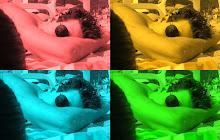 In an age of Youtube, MySpace and a seemingly endless streams of reality shows, Voyeurism has transformed from a reticent obsessive-compulsive behavior to an openly embraced obsessive-compulsive behavior that we collectively engage in, almost like a shared cinematic experience.
In an age of Youtube, MySpace and a seemingly endless streams of reality shows, Voyeurism has transformed from a reticent obsessive-compulsive behavior to an openly embraced obsessive-compulsive behavior that we collectively engage in, almost like a shared cinematic experience.Yousry Nasrallah's "Aquarium" explores the voyeuristic nature of our culture. Tarek, the protagonist and anti-hero suffers from a compulsive habit of roaming around the the botanic gardens in Zamelik
In the traiditon of Agitprop theatre, "Aquarium" is a politically charged, socially-conscious artistic endeavor. The film diagnoses the symptoms of our societal decay, our state of mind.
Cinema at the end of the Silent Era and the glossy Hollywood productions - dubbed "talkies" - that followed in the 1930's fostered similar behavior patterns. For many men and women faced with the harsh realities of the Great Depression and the great world war looming ahead, movie theatres virtually served as parallel universes, where they can live vicariously through the beautiful and glamorous heroes and heroines of the silver screen. They could, for a short period, forget the increasingly hostile, ugly world outside the theatre and experience a color-saturated, melodic dream-like existence, albeit short-lived. This was an Escapist mechanism of sorts, a mechanism that is not unlike what we exercise today.
Tarek, the protagonist, is a 30-something anesthesiologists who enjoys listening to the stories his patients mutter under anesthesia before undergoing surgery. He is excited by the prospect of dissecting the lives of others, their secrets and most intimate feelings and thoughts…uninvited.
He applies the same approach to those in his primary vicinity, irritating his phone-sex compulsive friend, who verbally objects to the fact that his life is an open book to Tarek, wheras Tarek reveals nothing about himself. Tarek goes through the motions of his daily life – visit girl friend, tend to hospital-ridden ailing father, anesthize his patients, etc. – with no emotional attachment, with borderline apathy. He is a mere observant in his own life story, a silent spectator.
The repercussions of cultivating a voyeuristic culture to society-at-large is made clear whenever Tarek ventures into the world: driving by silent "Kefaya" protesters lining the streets and blocking road. We see them through his windshield, sullen and muted. He passes them by as a mere observer, not participant.
Leila fares no better as the other side of the apathy coin. A successful radio show hostess, she is constantly stretching the boundaries of social acceptance on her late-night show, airing confessions of men and women with (often sexual) predicaments considered taboo. She lends a sympathetic ear, but little else. Like Tarek, she is apathetic to the political turmoil around her. She refuses to participate in events raising awareness on AIDS or anything remotely resembling activism. She reasons that it is not "her role".
Fear and repression are the dominant themes in Nasrallah's film. Fear of ostracizing is what prevents a mother from reporting to Police the rape of her own daughter. One of the most compelling scenes is one where the rape victim is lying back in the operation chair, anesthized in preparation for an abortion operation: her eyes and mouth wide open, listening to her mother talk to Tarek about her predicament. Unable, to shout, scream, move, she is paralyzed, figuratively by repressive societal norms that condemn her for a crime she did not commit.
Fear is what prevents Leila and Tarek from political activism, fear is what forces the Christian landlord to hand-pick only secular tenants.
Admittedly, all those fears are well founded. Honor killings are a reality for many rape victims, police brutality is a reality for political activists and religious intolerance is a reality for anyone that does not subscribe to fundamental Islam.
Fear is what drives the central and peripheral characters in "Aquarium" to commit unforgivable acts, or worse, do noting at all, paralyzed indefinitely, in a constant sleep-walking state, going through the motions, numb and mute.
Perhaps Nasrallah's worst fear is fear as a permanent state-of-mind, and the chronic paralysis that it triggers in people of all walks of life.




No comments:
Post a Comment